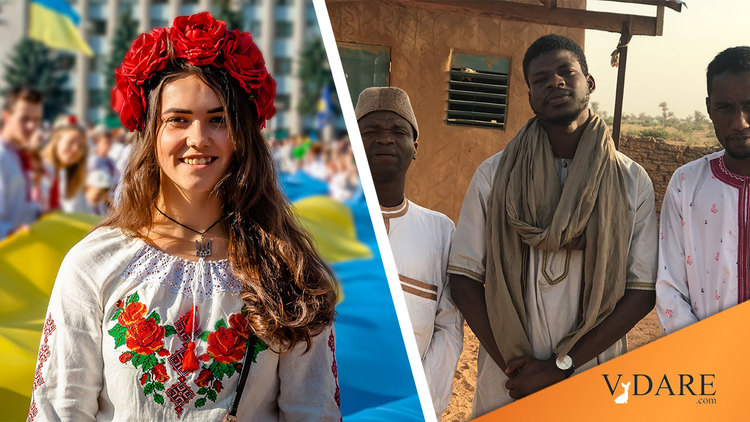
02/28/2022
From the Washington Post media news section:
‘They seem so like us’: In depicting Ukraine’s plight, some in media use offensive comparisons
Reaching for context in the Russian invasion, correspondents and pundits veer into a troubling tone on race and international status
Some academics have noted that in certain French media outlets, Ukrainians fleeing their country were “refugees,” but Afghans doing the same in August and September were “migrants.”
By Sarah Ellison and Travis M. Andrews
Today at 7:01 p.m. ESTRussia’s invasion of Ukraine shocked the world as the largest cross-border European conflict in decades. But some observers see a troubling tone creeping into how some media outlets have attempted to contextualize it, describing Ukraine as more “civilized” than other countries, such as Iraq, Afghanistan or Syria.
In one notable CBS News segment, senior foreign correspondent Charlie D’Agata, reporting from Kyiv, said Friday that Ukraine “isn’t a place, with all due respect, like Iraq or Afghanistan, that has seen conflict raging for decades. This is a relatively civilized, relatively European — I have to choose those words carefully, too — city, where you wouldn’t expect that or hope that it’s going to happen.”
The statement went viral, and D’Agata, a veteran war correspondent, issued an apology Saturday, saying he had “used a poor choice of words” that he regretted. “What I had hoped to convey is that what’s unique about the fighting underway here is that this country has not really seen this scale of war in recent years, unlike some conflicts in countries I’ve covered that have tragically suffered through many years of fighting.”
But D’Agata was just one of many correspondents and commentators using offensive comparisons in their effort to explain Ukraine’s plight.
ITV News correspondent Lucy Watson reported from a train station in Kyiv that the “unthinkable” had happened to the people of Ukraine. “This is not a developing third-world nation,” she said. “This is Europe.”
Likewise, in a segment on the BBC, David Sakvarelidze, former deputy prosecutor general of Ukraine, described his emotional response in seeing “European people with blue eyes and blond hair being killed, children being killed every day” in his country.
Liberal Americans will be surprised when it dawns on them that Ukrainians who want to be out from under Russian influence look to conservative pariah states like Poland and Hungary as models.
Daniel Hannan, a former Conservative member of European Parliament, wrote in London’s Telegraph newspaper of the Ukrainian people being attacked: “They seem so like us. That is what makes it so shocking. War is no longer something visited upon impoverished and remote populations. It can happen to anyone.”
Such coverage resorts to “Orientalist concepts of ‘civilization’ that have long been present in European colonial discourse,” said Denijal Jegic, a postdoctoral researcher in communication and multimedia journalism at Lebanese American University in Beirut, in an interview. “This implicitly suggests that war is a natural phenomenon in places outside of the Euro-American sphere, and the Middle East in particular, and that war would take place because of a lack of civilization, rather than due to unjust geopolitical power distribution or foreign intervention.”
… “The casual racism is shocking,” said Rasha Elass, a D.C.-based Syrian American journalist who traveled to Syria to cover the conflict there for a variety of publications. The Russian invasion of Ukraine is jarring, because “this is literally the closest it has gotten in our lifetime to a world war, … and in that regard, it is very different from the U.S. invading Afghanistan or the regional war in Syria. But it is not because one area is civilized and the other is not. It is because of the geopolitics and what is at stake.”
Philip Seib, professor emeritus of journalism and public diplomacy at the University of Southern California and author of “Information at War: Journalism, Disinformation, and Modern Warfare,” said such disparities in reporting have historical roots. “One of the most striking examples came in the 1990s, when tens of thousands of White people were dying in the Balkans and hundreds of thousands of Black people were dying in Rwanda, and the Balkans got much more coverage,” Seib said. “There seems to be a gravitational pull leading to more Western coverage of people who are ‘like us,’ to use their term.”
… On the French channel BFM TV, another commentator noted that “we’re not talking about Syrians fleeing bombs of the Syrian regime backed by [Russian President Vladimir] Putin, we’re talking about Europeans leaving in cars that look like ours to save their lives.”
And in another segment, the channel’s Ulysse Gosset remarked that: “We are in the 21st century, we are in a European city, and we have cruise missile fire as though we were in Iraq or Afghanistan, can you imagine!”
Seib thinks these double standards in international coverage will become less prominent over time as newsrooms diversify. “It’s slowly, slowly getting better, because the news business is becoming slowly, slowly more diverse,” he said.
The theme was remarkable enough to gain a mention on “Saturday Night Live” this weekend. The show opened with the Ukrainian Chorus Dumka of New York singing “Prayer for Ukraine.” But later, Weekend Update co-host Michael Che joked about the media coverage of the conflict, saying: “This is a tough subject to make jokes about. I mean, in my lifetime I’ve seen footage of attacks like this on other countries, but never a White one.”
Here’s another variation on media using Ukraine to suggest racism. Black New York Times writer who hyper-focuses on black issues and demands we all do the same suggests media’s current focus on Ukraine is a “dog whistle”. pic.twitter.com/KuT2B7K4sq
— Frank DeScushin (@FrankDeScushin) February 27, 2022
Worrying more about Eastern Europe makes sense because white people have more tanks, jets, and…nuclear weapons.
Let’s be worried.
This is a content archive of VDARE.com, which Letitia James forced off of the Internet using lawfare.